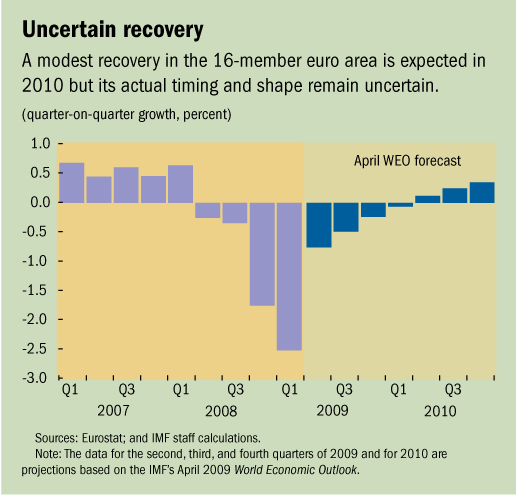
Typical street scene in Santa Ana, El Salvador. (Photo: iStock)
IMF Survey: IMF Says Euro Area Still Needs to Clean Up Banking Sector
June 8, 2009
- Signs of improvement, but recovery likely to be slow
- Decisive action needed in financial sector
- Historic opportunity to overhaul financial stability rules should be seized
The IMF, wrapping up its consultations with euro area officials on June 8 in preparation for its annual assessment of the euro area’s economy, said the region still needs to do more to clean up its banking sector, weakened by the global financial crisis.

Shopping center in Frankfurt, Germany: fragile consumer, business confidence weakening euro area demand (photo: Thomas Lohnes/AFP)
ECONOMIC HEALTH CHECK
The final report will be issued to the public once it has been discussed by the IMF’s 24-member Executive Board.
“The worst of the decline of activity is now very likely behind us but the timing and the shape of the recovery remain highly uncertain,” Marek Belka, Director of the IMF’s European Department, told a meeting of the Eurogroup on June 8 (the Eurogroup includes the 16 finance ministers representing the euro area’s member countries as well as the president of the European Central Bank).
The IMF’s most recent forecast for 2009 sees a 4.2 percent decline in economic output for the euro area, and a recovery during the course of 2010 (see chart). “When it finally occurs, the recovery is likely to be slow,” Belka said. Three important elements are weighing on the outlook.
• Remaining strains in the financial system, including those emanating from the recession, are creating uncertainty.
• Fragile confidence among consumers and businesses makes for weak demand.
• Structural rigidities, especially in the labor market, are threatening to turn the recession into a protracted period of slow growth.

Time to clean up the banks
“The banking sector is key to a sustainable recovery,” Belka said. There are three reasons why cleaning up the financial system should be the top priority.
• First, without a properly functioning financial system, monetary and fiscal policies will not be as effective as they could be in supporting demand.
• Second, with the wave of losses from the recession still to hit the financial system, there continues to be a significant risk of a further negative feedback loop with the real economy.
• Third, without further comprehensive action, the European financial system could well remain on a drip-feed of taxpayers’ money for a long time to come. Private investors will not step in, and constraints associated with government intervention will reduce overall efficiency. This would be a recipe for a prolonged spell of slow growth.
“Left to their own devices, banks have too many incentives to simply muddle through,” Belka said. To make sure the remaining problems in the banking system are addressed, the IMF is backing a coordinated and proactive review of the financial positions and viability of banks.
While national supervisors have to be in the driving seat, the institutions of the European Union should set out guidelines to avoid cross-border distortions, ensure that national reviews are completed on time and in coordination with other countries, and prevent an inefficient and disorderly exit from government intervention in the banking sector.
The IMF also fully supports the proposed overhaul of the EU’s financial stability framework based on a recent report by former IMF Director Jacques de Larosière, Belka said. “The crisis has indicated beyond doubt the need for new financial stability arrangements in Europe. The considerable momentum that has been built in recent weeks to make historic changes to these arrangements should be fully seized. In this context, we strongly endorse the Commission’s proposal for a new supervisory framework for the EU and hope that it can be adopted on an ambitious timetable.”
Treacherous waters
On fiscal policy, policymakers are burdened with the uneasy task of having to provide significant public resources to shore up the financial sector and cushion the downturn, while addressing solvency and sustainability concerns.
“With a slow and uncertain recovery ahead, care should be taken not to withdraw fiscal stimulus prematurely,” Belka said. At the same time, stronger action to address sustainability concerns is needed, with a sharp focus on overall levels of debt and the costs of aging. “We would therefore strongly urge national policymakers to start putting in place plans for further consolidation, to be implemented as soon as the recovery takes place, and ensure their synchronization across the countries of the monetary union,” he said.
On monetary policy, the ECB should maintain its current supportive policies. “We appreciate very much that the ECB has taken a clear medium-term perspective, surrounding all its actions with appropriate safeguards, and leaving little doubt as to its ability to maintain price stability over the long run,” Belka said.
Finally, progress on structural reforms has become more important than ever to ensure that the recovery is built on a solid foundation.
Comments on this article should be sent to imfsurvey@imf.org







